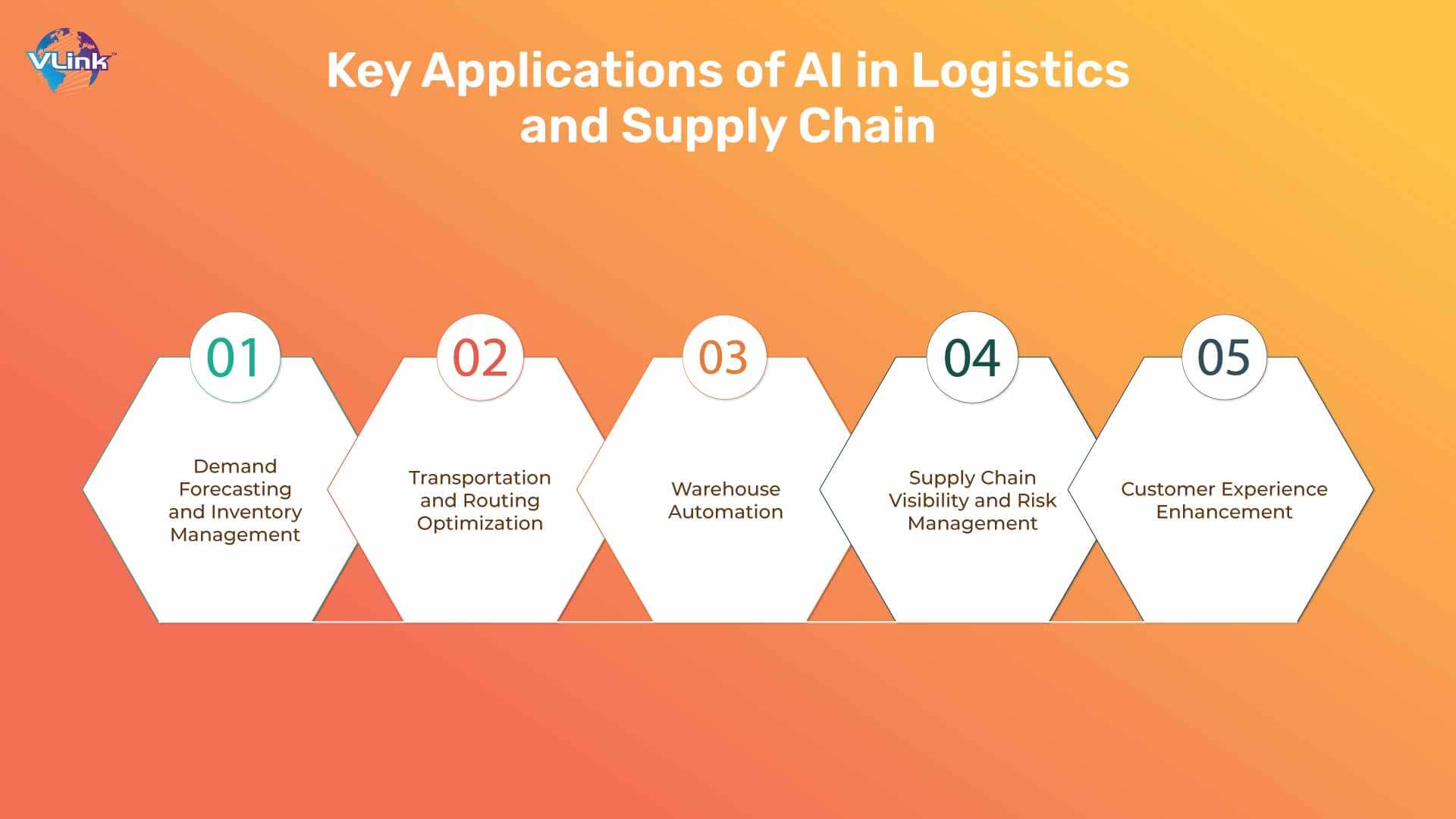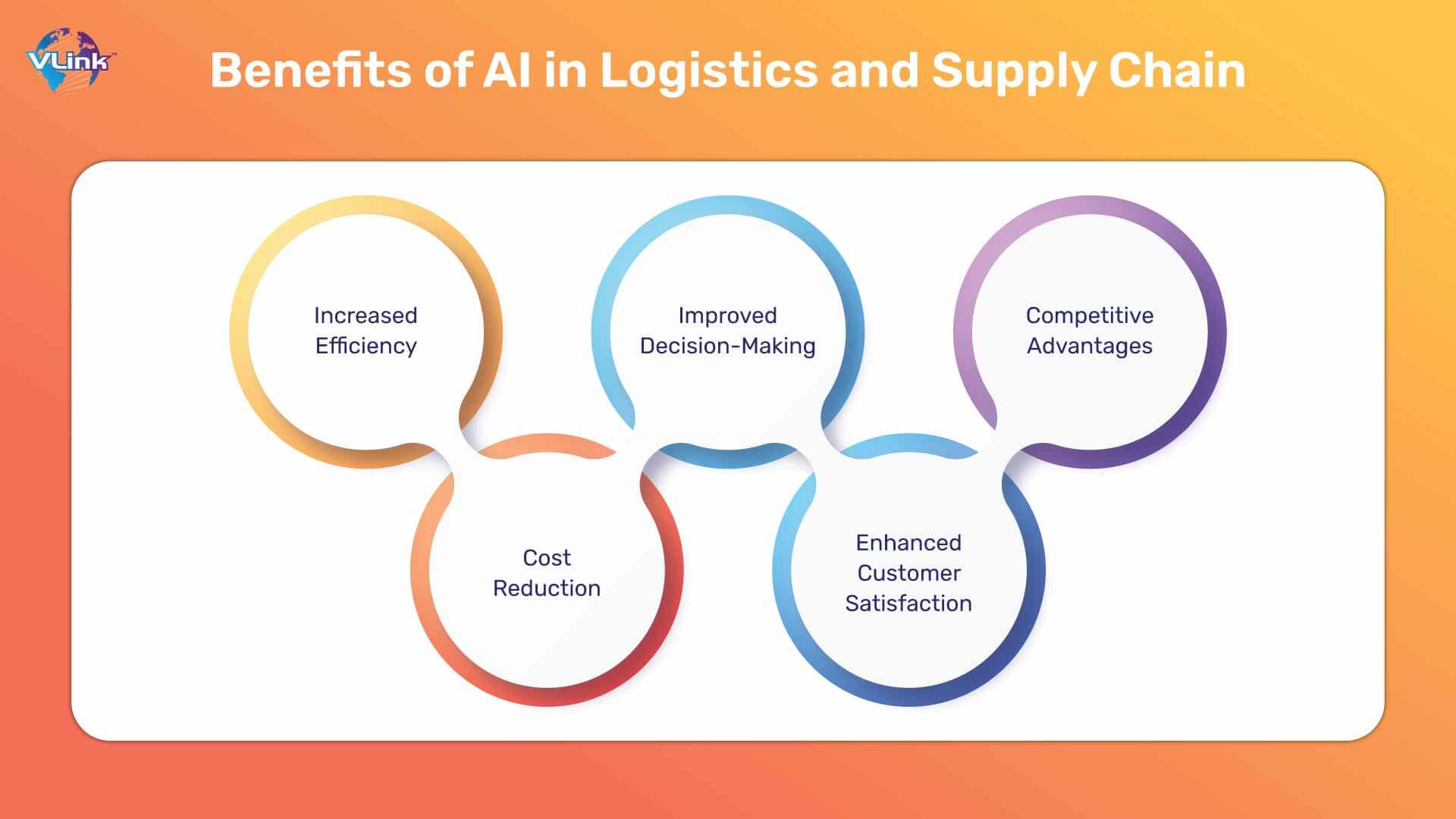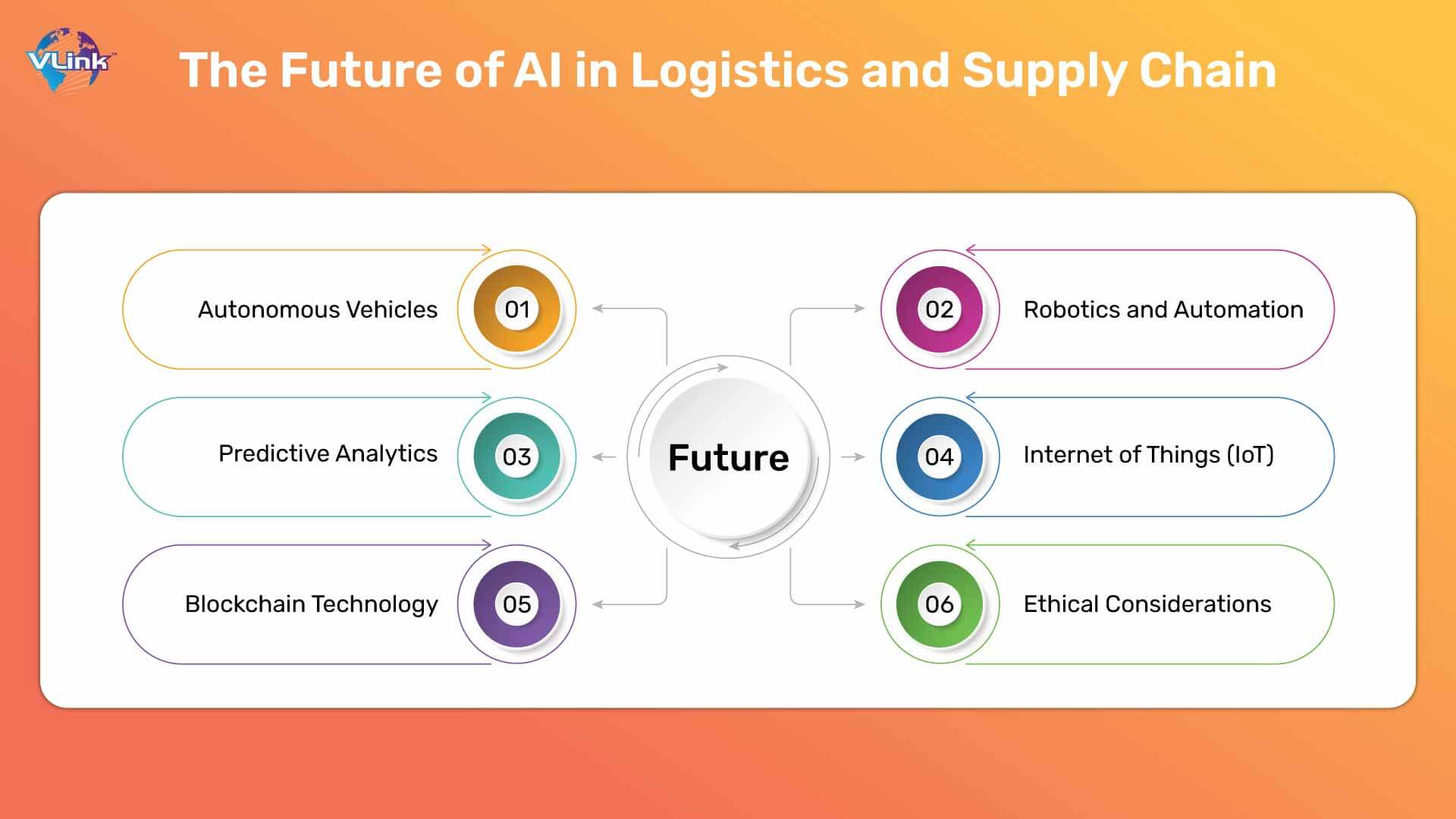Artificial Intelligence (AI) development services are rapidly reshaping industries worldwide, and the logistics and supply chain sector is no exception. According to a recent study by McKinsey, AI has the potential to add up to USD 1.6 trillion in value to the global logistics industry by 2030.
By leveraging AI's capabilities, businesses can streamline operations, enhance efficiency, reduce costs, and improve customer satisfaction. In this comprehensive blog post, we will explore how AI is transforming logistics and supply chain landscape.
Understanding AI in Logistics and Supply Chain
Artificial intelligence (AI) primarily encompasses the creation of systems capable of executing tasks traditionally associated with human intellect. These tasks include learning from experience, making logical deductions, resolving complex problems, and perceiving the world around them.
In the context of logistics and supply chain, AI encompasses a wide range of technologies, including:
- Machine Learning: Algorithms that enable computers to learn from data and improve their performance over time. For example, machine learning can be used to predict demand for products, optimize transportation routes, and identify potential risks in the supply chain.
- Natural Language Processing (NLP): Techniques for understanding and interpreting human language. NLP can be used to automate customer service tasks, such as answering customer inquiries and resolving complaints.
- Computer Vision: Systems that can interpret and understand visual information. Computer vision can be used to automate tasks such as inspecting products for defects and tracking inventory levels.
- Robotics: Automated machines capable of performing tasks that would traditionally require human labor. Robotics can be used to automate tasks such as picking, packing, and sorting products in warehouses.
Key Applications of AI in Logistics and Supply Chain
Artificial Intelligence (AI) is rapidly transforming the logistics and supply chain industry, offering innovative solutions to enhance efficiency, reduce costs, and improve overall performance.
Here are some of the key applications of AI in this sector:

1. Demand Forecasting and Inventory Management:
- Accurate predictions: AI algorithms can analyze historical data, market trends, and external factors to forecast demand for products accurately. For example, by considering factors such as seasonality, economic indicators, and social media sentiment, AI can predict fluctuations in demand for specific products.
- Optimized inventory levels: By anticipating demand, businesses can maintain optimal inventory levels, reducing the risk of stockouts or excess inventory. AI can help determine the optimal inventory levels for different products based on factors such as lead times, demand variability, and holding costs.
- Demand sensing: AI-powered systems can continuously monitor real-time data, such as point-of-sale information and social media sentiment, to detect changes in demand and adjust inventory accordingly. This allows businesses to respond quickly to unexpected changes in demand, such as product recalls or sudden increases in popularity.
2. Transportation and Routing Optimization:
- Efficient route planning: AI can optimize transportation routes, considering factors such as distance, traffic conditions, and delivery time windows. By analyzing real-time traffic data, weather conditions, and other relevant factors, AI can determine the most efficient routes for deliveries.
- Vehicle telematics: AI-enabled telematics systems can track vehicle location, monitor fuel consumption, and identify potential maintenance issues. This information can be used to optimize routes, reduce fuel costs, and prevent breakdowns.
- Autonomous vehicles: The development of self-driving trucks and delivery drones has the potential to revolutionize transportation, reducing costs and increasing efficiency. Autonomous vehicles can operate 24/7, reducing the need for human drivers and minimizing downtime.
3. Warehouse Automation:
- Automated storage and retrieval systems (ASRS): AI-powered ASRS can efficiently store and retrieve products, minimizing manual labor and reducing errors. ASRS can be integrated with AI-powered inventory management systems to optimize storage locations and reduce retrieval times.
- Robotics and automation: Robotic systems can perform tasks such as picking, packing, and sorting, improving productivity and accuracy. Robots can work alongside human workers, complementing their skills and reducing the need for repetitive and physically demanding tasks.
- Inventory management: AI can track inventory levels in real-time and identify discrepancies, ensuring accurate stock counts and reducing losses. AI-powered inventory management systems can also provide alerts for low stock levels and potential stockouts, allowing businesses to take proactive measures to avoid disruptions.
4. Supply Chain Visibility and Risk Management:
- Real-time tracking: AI-enabled tracking systems can provide real-time visibility into the movement of goods throughout the supply chain. This allows businesses to monitor the status of their shipments, identify potential delays or disruptions, and take corrective actions as needed.
- Risk identification and mitigation: AI algorithms can analyze data to identify potential risks, such as disruptions in transportation or changes in market conditions. By identifying risks early on, businesses can develop contingency plans and mitigate their impact.
- Supply chain resilience: By proactively addressing risks, businesses can improve the resilience of their supply chains and minimize disruptions. AI can help businesses build more robust supply chains by identifying alternative suppliers, diversifying transportation routes, and implementing risk management strategies.
5. Customer Experience Enhancement:
- Personalized recommendations: AI can analyze customer data to provide personalized product recommendations and improve the overall customer experience. By understanding customer preferences and purchase history, AI can suggest products that are more likely to be of interest to them.
- Predictive maintenance: By predicting equipment failures, AI can help prevent disruptions in service and improve customer satisfaction. AI-powered predictive maintenance systems can monitor the health of equipment and identify potential problems before they occur, reducing downtime and improving reliability.
Benefits of AI in Logistics and Supply Chain

Artificial Intelligence (AI) offers numerous benefits to the logistics and supply chain industry, including:
Increased Efficiency
- Automation of repetitive tasks: AI can automate routine tasks such as data entry, order processing, and inventory management, freeing up human workers to focus on more strategic activities.
- Optimization of processes: AI can analyze data to identify inefficiencies and optimize processes, such as transportation routes and warehouse layouts.
- Reduction of errors: AI can help reduce human errors, such as mistakes in order fulfillment or inventory management.
Cost Reduction
- Improved resource allocation: AI can help businesses allocate resources more efficiently, such as by optimizing inventory levels and transportation routes.
- Reduced waste: AI can help reduce waste in the supply chain by preventing stockouts and excess inventory.
- Lower operating costs: AI can help reduce operating costs by automating tasks, optimizing processes, and improving efficiency.
Improved Decision-Making
- Data-driven insights: AI can provide valuable insights into data that would be difficult or impossible for humans to analyze.
- Predictive analytics: AI can be used to predict future trends and events, such as changes in demand or supply chain disruptions.
- Optimized decision-making: AI can help businesses make more informed and data-driven decisions.
Enhanced Customer Satisfaction
- Faster delivery times: AI can help businesses improve delivery times by optimizing transportation routes and reducing delays.
- Improved accuracy: AI can help reduce errors in order fulfillment and shipping, leading to higher customer satisfaction.
- Personalized service: AI can be used to provide personalized customer service, such as recommending products or services based on customer preferences.
Competitive Advantages
- Differentiation: AI can help businesses differentiate themselves from competitors by offering improved services, faster delivery times, and lower costs.
- Innovation: AI can enable businesses to innovate and develop new products and services.
- Resilience: AI can help businesses build more resilient supply chains by identifying and mitigating risks.
By leveraging AI, businesses can improve their logistics and supply chain operations, reduce costs, enhance efficiency, and improve customer satisfaction.
Challenges and Considerations
Despite the numerous benefits, implementing AI in logistics and supply chain comes with certain challenges:
- Data quality and availability: AI relies on high-quality data to function effectively. Ensuring data accuracy and completeness can be a challenge, especially in industries with complex supply chains and diverse data sources.
- Cost and complexity: Implementing AI solutions can be costly and complex, requiring significant investment and expertise. The initial cost of developing and implementing AI systems can be high, and there may be ongoing costs associated with maintenance and updates.
- Ethical considerations: The use of AI raises ethical concerns, such as job displacement and privacy issues. As AI becomes more prevalent in logistics and supply chains, it is important to consider the potential impact on jobs and ensure that privacy regulations are followed.
- Integration and scalability: Integrating AI solutions with existing systems and ensuring scalability can be challenging. AI systems may need to be integrated with various other systems, such as enterprise resource planning (ERP) systems, transportation management systems (TMS), and warehouse management systems (WMS).
Additionally, AI systems must be able to scale as the business grows and the volume of data increases.
The Future of AI in Logistics and Supply Chain

The future of AI in logistics and supply chain is bright, with many exciting developments on the horizon. Here are some key trends to watch:
Autonomous Vehicles
- Increased adoption: Autonomous vehicles, such as self-driving trucks and delivery drones, are expected to become more prevalent in the logistics and supply chain industry. This could surely lead to cost savings and improved efficiency.
- Integration with other technologies: Autonomous vehicles will likely be integrated with different AI technologies, such as machine learning and computer vision, to further enhance their capabilities.
- Last-mile delivery: Autonomous vehicles have the potential to revolutionize last-mile delivery, reducing costs and improving delivery times.
Robotics and Automation
- Advancements in robotics: Robotics technology is expected to continue to advance, with robots becoming more capable of performing complex tasks in logistics and supply chain operations.
- Increased automation: There will be a continued trend towards automation in warehouses, distribution centers, and transportation hubs.
- Collaborative robots: Collaborative robots, or cobots, are expected to become more common, working alongside human workers to improve efficiency and productivity.
Predictive Analytics
- Improved forecasting: AI-powered predictive analytics will become even more accurate and reliable, enabling businesses to forecast demand better, optimize inventory levels, and identify potential disruptions.
- Risk management: Predictive analytics can identify and mitigate risks in the supply chain, such as disruptions in transportation or changes in market conditions.
- Supply chain resilience: Predictive analytics can help businesses build more resilient supply chains by identifying and addressing potential risks before they occur.
Internet of Things (IoT)
- Increased connectivity: The widespread adoption of IoT services will enable businesses to collect vast amounts of data from sensors and other devices throughout the supply chain.
- Real-time insights: AI can analyze IoT data to provide real-time insights into the status of the supply chain and identify potential problems.
- Predictive maintenance: IoT sensors can monitor equipment health and predict potential failures, allowing businesses to schedule maintenance proactively and avoid disruptions.
Blockchain Technology
- Enhanced transparency: Blockchain services can be used to create a transparent and immutable record of transactions and events in the supply chain.
- Improved traceability: Blockchain can help improve product traceability, making it easier to track their origin and ensure quality.
- Supply chain security: Blockchain can help improve the security of the supply chain by reducing the risk of fraud and counterfeiting.
Ethical Considerations
- Job displacement: As AI becomes more prevalent in logistics and supply chains, there is a risk that it could displace human workers.
- Privacy: AI systems' collection and use of data raises privacy concerns, as it is important to ensure that data is handled responsibly and ethically.
Overall, the future of AI in logistics and supply chain is promising. By embracing AI technologies, businesses can improve their efficiency, reduce costs, enhance customer satisfaction, and build more resilient supply chains.
Conclusion
AI is transforming the logistics and supply chain industry by enabling businesses to optimize operations, reduce costs, and improve customer satisfaction. By leveraging AI's power, companies can stay ahead of the competition and build more resilient and efficient supply chains.
As AI technology continues to advance, we can expect to see even more groundbreaking applications in the years to come. If you're interested in learning more about how AI can transform your logistics and supply chain operations, contact us now. VLink’s dedicated team of experts can help you assess your needs and develop a customized AI solution.










 Shivisha Patel
Shivisha Patel

















